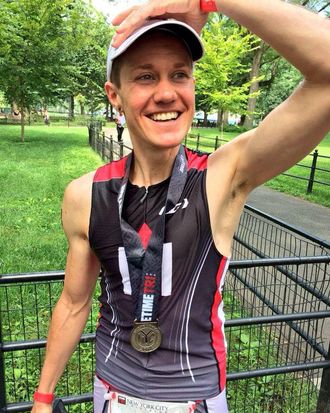
Chris Mosier still isn’t sure whether he’ll be allowed to toe the starting line of the World Championships sprint duathlon in June — despite qualifying at last year’s U.S. Championships — but thanks in part to his activism, the highest power in sports said this week he and other trans athletes are eligible to compete.
Mosier is the first trans athlete to make a U.S. national team, and his seemingly unlikely success competing against cisgender men raised questions about the existing policies for trans participation in elite sporting events. Until recently, he was ineligible to compete in world championships because he hasn’t had reconstructive genital surgery (which, by the way, is a completely optional part of transitioning and is often not covered by insurance). Under the previous recommendations from 2004, “external genitalia changes” were a condition for both male-to-female and female-to-male athletes. Furthermore, trans women were not permitted to enter events as women until two years post-surgery.
But earlier this week, the International Olympic Committee (IOC) released updated guidelines that reflect “current scientific, social, and legal attitudes” by eliminating the requirement for athletes to have surgery before competing in the Olympics and other international events. The IOC medical commission says the new stance helps ensure that trans athletes aren’t unfairly excluded from competition, and it underscores the larger ideas that one’s genitals do not define gender, or impact athletic competition. They wrote: “To require surgical anatomical changes as a pre-condition to participation is not necessary to preserve fair competition and may be inconsistent with developing legislation and notions of human rights.”
Now, trans women will be able to compete in the female category once they demonstrate their testosterone levels have been below a specified level for one year. Trans men can participate in men’s competitions without any restrictions. (The NCAA has had similar rules in place since 2011.)
Mosier says removing the surgery requirement is a huge victory that would have happened at some point but was hurried along by his case. “Medical experts have said that this is unnecessary, that anatomical changes have no impact on sport performance,” he told the Cut. “I think that we’ve been working toward this change and it really just took having an athlete and a name and a face to put to a story to see how this impacts people.”
When he qualified for the national team in men’s sprint duathlon (that’s run-bike-run) in June, he promptly contacted the International Triathlon Union, which hosts the World Championships, to determine their policies for trans athletes. The ITU didn’t give him a solid answer, but they did later tell ESPN the Magazine that, like many other sports federations, they follow IOC policies. Now that the IOC has changed its position, Mosier just needs to make sure that ITU will also abide by the new guidelines — and he’s ready to go to court if they won’t.
In the meantime, he’s happy that more athletes will have opportunities at the national and international levels. “I’m eligible to compete in a world championship, and I think that’s the first time that’s ever happened. That’s just tremendous for other athletes to see that it’s possible to be your authentic self and to continue to be an athlete.”
He’s also quick to point out that he won’t be an Olympian since duathlon isn’t part of the Games, but that doesn’t matter to him. “I will not be an Olympian, but I’m eligible to be. I could be, if I was good enough in any particular sport.
“I’m not an Olympian, but there will be [a trans] Olympian someday.”

